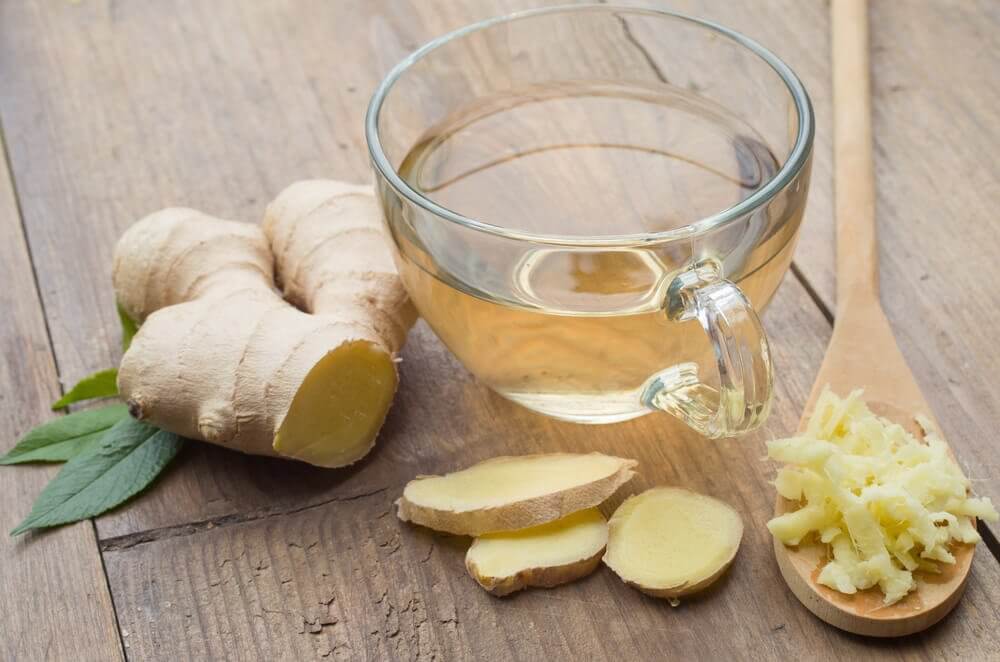Make a Homemade Antiviral with Ginger
You can find cures for the most common illnesses in nature. Ginger is one of them.
Thanks to its properties, ginger has been used since ancient times as a natural medicine to treat various ailments. It’s very effective when treating cardiovascular and muscular problems, especially for the common symptoms of flu, cold, and coughs.
To get the most of its properties, you can make it into a powerful homemade antiviral tea.
The general health benefits of ginger
Ginger is a tuber with many health benefits. Some of these include:
- Improving metabolism: The plant contributes towards the absorption of nutrients. It also helps to increase your appetite if you eat it shortly before meals.
- It combats dizziness and nausea: Instead of resorting to pills, you can use the properties of ginger. Chewing a little piece of this tuber will alleviate dizziness. To counteract its strong taste, we recommend you mix it with a little honey.
- You can also chew ginger in cases of nausea. This is recommended a lot for pregnant women as a natural option for the common symptoms of pregnancy. In all cases, the best is to take it in the morning.
- It alleviates muscle pains: With its anti-inflammatory properties, this plant acts on the joints and muscles to reduce pain caused by advanced age or intense exercise.
- It fights against congestion: One cup of ginger tea is perfect for congestion and will help you get a better night’s sleep. They say that inhaling ginger essence is ideal for unblocking your airways.
- Ginger helps care for your heart: It’s also recommended for treating and preventing heart diseases. Many people with various heart problems include ginger in their diet in order to stay healthy.
Why is it an excellent homemade antiviral remedy?
The root is the most used part of the ginger plant. The components in ginger that make it an excellent antiviral remedy are vitamin C, curcumin, various amino acids, oxalic acid, and flavonoids.
It’s a great remedy for coughs, flu, and colds because it’s anti-inflammatory, antiviral, antioxidant, anti-bacterial, and an expectorant.
How to make an antiviral tea with ginger
There are many ways to consume ginger to get the most benefits. You can add slices or ground ginger to certain meals to treat a cough or flu symptoms.
However, tea is one of the most effective ways to get the most benefits.
Ginger tea
Below, we’ve included a simple way to make ginger tea, with a few extra added ingredients for a smoother taste.
Ingredients
- 2 slices of root ginger
- 2 cups of water (500 ml)
- Honey (to taste)
How to prepare it
- First, wash the ginger and cut it into medium-thick slices.
- Then, heat the water in a pot.
- When the water is boiling, add the ginger root and leave it on the heat for approximately 10 minutes. The time you leave it will determine how concentrated the tea is.
- Then, leave the tea to rest and sweeten it.
- We recommended drinking it 2 or 3 times per day to see results.
Ginger tea with cinnamon
Cinnamon stands out for being an excellent anti-inflammatory and anti-bacterial which regulates body temperature. It’s ideal for mixing with ginger to effectively fight colds if you also have a fever.
Ingredients
- 1 slice of ginger
- 1 stick of cinnamon
- Juice of ½ lemon
- 1 cup of water (250 ml)
- Honey (to taste)
How to prepare it
- Wash the ginger well. Add it to the water when it’s boiling.
- Then, add the cinnamon and leave it on the heat for around 10 minutes.
- After, remove the mixture from the heat and pour yourself a glass. Add the lemon juice and sweeten with the honey.
- Mix well and leave it to steep and cool before drinking. We recommend drinking one or two glasses a day.
Although the choice to sweeten the tea depends on your tastes, adding honey also adds more antiviral power, since honey has great a antibiotic action to get rid of viruses and bacteria.
Honey also has expectorant properties to help treat asthma and other respiratory problems.
As you can see, ginger can have a very powerful antiviral effect. By consuming ginger, you’ll be able to stay protected without suffering the side-effects that chemical products tend to have.
All cited sources were thoroughly reviewed by our team to ensure their quality, reliability, currency, and validity. The bibliography of this article was considered reliable and of academic or scientific accuracy.
- Grzanna, R., Lindmark, L., & Frondoza, C. G. (2005). Ginger—An Herbal Medicinal Product with Broad Anti-Inflammatory Actions. Journal of Medicinal Food. https://doi.org/10.1089/jmf.2005.8.125
- White, B. (2007). Ginger: An overview. American Family Physician. https://doi.org/10.1039/C4CC06344A
- Thomson, M., Al-Qattan, K. K., Al-Sawan, S. M., Alnaqeeb, M. A., Khan, I., & Ali, M. (2002). The use of ginger (Zingiber officinale Rosc.) as a potential anti-inflammatory and antithrombotic agent. Prostaglandins Leukotrienes and Essential Fatty Acids. https://doi.org/10.1054/plef.2002.0441
- Nurdjannah, N., & Bermawie, N. (2012). Handbook of Herbs and Spices. Handbook of Herbs and Spices: Second Edition. https://doi.org/10.1533/9780857095671.319
